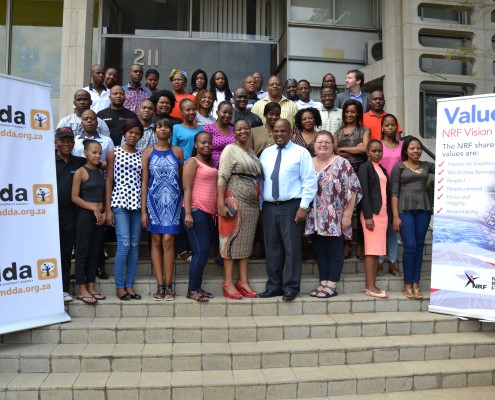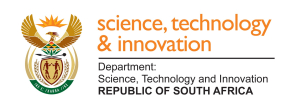The Media Development and Diversity Agency (MDDA) and the South African Agency for Science and Technology Advancement (SAASTA) this week signed a memorandum of understanding (MOU) through which they will promote science journalism.
The MOU will find expression in the Science and Technology Youth Journalist Programme that the two organisations have launched with the first batch of trainees and community media journalists attending a two-day workshop at SAASTA offices in Pretoria on Wednesday and Thursday.
The memorandum of understanding aims to seek opportunities to co-operate in order that each party may achieve their respective goals/mandates more successfully and that together they may make a meaningful contribution to science engagement in South Africa for society’s benefit.
“We believe that our partnership with the MDDA will help us achieve the objectives of the Science Engagement Framework that the Minister of Science and Technology approved in 2015,” SAASTA MD Jabu Nukeri said. “SAASTA is the designated national coordinator of the framework.
“The objectives of the framework include popularising science, engineering and innovation as attractive, relevant and accessible in order to enhance scientific literacy and awaken interest in relevant careers, and developing a critical public that actively engages and participates in the national discourse of science and technology for the benefit of society.
“Further, it aims to promote science communication that will enhance science engagement in South Africa, and to profile South African science and science achievements domestically and internationally, demonstrating their contribution to the national development and global science, thereby enhancing its public standing.”
Dr Nukeri added that the media was an important conduit of disseminating information to the general public. Therefore, the Science and Technology Youth Journalist training programme would enable SAASTA to entrench dialogue between scientists and society in line with its mandate.
“In the delivery of our mandate to develop and diversify community media, the MDDA values the very important role that journalists, including our local media, play as knowledge interpreters and communicators on behalf of our country’s scientific and technological community,” said MDDA Acting CEO, Ms Thembelihle Sibeko,
“Science, technology and innovation is critical to the sustainability of all aspects of development in South Africa, including poverty alleviation and economic growth. But as important is the ability of South African communities to exploit scientific and technological solutions for their specific needs.
“Initiatives such as this SAASTA partnership therefore go a long way in ensuring that we capacitate our journalists in an environment that encourages such knowledge to be communicated and applied to our nation’s and its communities’ needs.”
SAASTA recognises the MDDA and the community media as an important stakeholder and channel for dissemination of critical information to the South African public, and the MDDA as a strategic partner in order to facilitate access to the community media.
SAASTA will support the MDDA in the following areas: training community media on science communication/journalism; launching awards in science journalism in the community media to promote excellence and creativity in science coverage and recommend to SAASTA hosts for Science and Technology Youth Journalist Programme in various community media houses in our targeted municipalities in KwaZulu-Natal, Mpumalanga, Eastern Cape, North West and Limpopo.
SAASTA believe that interns will contribute towards introducing science related articles in the community media and increasing capacity in various community media outlets in the country and gain valuable experience in return.
Science and Technology Youth Journalist Programme background information
The Science and Technology Youth Journalist Programme will be implemented within District Municipalities where the DST’s Innovation Partnership for Rural Development Programme’s (IPRDP) technologies are being demonstrated. It is aimed at youth (18-35 years) residing within these communities, specifically unemployed youth with undergraduate qualifications in science and engineering, communications and journalism studies.
The Department of Science and Technology in support of the Comprehensive Rural Development Programme, has provided funding for the South African Agency for Science and Technology Advancement to implement this project as part of the IPRDP, which is intended to gather knowledge, evidence and learning for integrating innovative technologies in improving access and quality of public service delivery.
SAASTA is a business unit of the National Research Foundation. SAASTA aims to be the leading science advancement agency in the country by promoting and communicating the value and impact of science, technology and innovation in a dynamic knowledge economy. It also intends to contribute significantly towards building a science, engineering and technology (SET) human resource base.
Contact
Zamuxolo Matiwana
Media Coordinator
Email: zamuxolo@saasta.ac.za
Call: 012 392 9319



 The South Africa Agency for Science and Technology Advancement (SAASTA) is a business unit of the
The South Africa Agency for Science and Technology Advancement (SAASTA) is a business unit of the 
